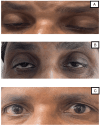Exploring Treatments for a Rare Guillain-Barré Variant: A Case Report of Miller-Fisher Syndrome
- PMID: 39192912
- PMCID: PMC11349248
- DOI: 10.7759/cureus.65561
Exploring Treatments for a Rare Guillain-Barré Variant: A Case Report of Miller-Fisher Syndrome
Abstract
The symptoms of Miller-Fisher syndrome (MFS) are a triad of areflexia, ataxia, and ophthalmoplegia. The condition is a rare variant of Guillain-Barré syndrome (GBS), an acute immune-mediated nerve disorder. Both conditions involve abnormal autoimmune responses that may often be triggered by infections such as Campylobacter jejuni, human immunodeficiency virus, Epstein-Barr virus, and Zika virus, among others. As a result, the immune system mistakenly attacks the body's own nerve tissues. MFS is characterised by ophthalmoparesis, which can progress to complete external ophthalmoplegia and may include ptosis, facial nerve paralysis, sensory impairments, and muscle weakness. Diagnosis is supported by lumbar puncture, revealing albumin-cytologic dissociation, although initial tests may not always be indicative. A diagnostic marker for MFS is the presence of anti-GQ1b antibodies, which target the GQ1b ganglioside in nerves and affect oculomotor function in particular. Electrodiagnostic studies often show absent or reduced sensory responses without reduced conduction velocity. Treatment options include intravenous immunoglobulin therapy and plasmapheresis, which are both equally effective. This case study demonstrated significant clinical improvement in a patient undergoing plasmapheresis due to financial constraints, highlighting the efficacy of this treatment approach. A 50-year-old female presented with limb paraesthesia, progressive ptosis, imbalance, and transient diplopia following a recent fever. Examination revealed stable vitals, decreased deep tendon reflexes, reduced vibratory sensation, cerebellar ataxia, and cranial nerve abnormalities. Cerebrospinal fluid analysis showed elevated protein, suggesting MFS. Normal magnetic resonance imaging and nerve conduction studies indicated GBS, with positive anti-GQ1b antibodies. After five plasma exchange cycles, the patient improved substantially and was discharged with no residual symptoms after one month.
Keywords: gbs variant; intravenous immunoglobulins (ivig); miller-fisher syndrome; ophthalmoplegia syndrome; plasmapheresis.
Copyright © 2024, Diggikar et al.
Conflict of interest statement
Human subjects: Consent was obtained or waived by all participants in this study. Conflicts of interest: In compliance with the ICMJE uniform disclosure form, all authors declare the following: Payment/services info: All authors have declared that no financial support was received from any organization for the submitted work. Financial relationships: All authors have declared that they have no financial relationships at present or within the previous three years with any organizations that might have an interest in the submitted work. Other relationships: All authors have declared that there are no other relationships or activities that could appear to have influenced the submitted work.
Figures
Similar articles
-
Acute-Onset Bilateral External and Internal Ophthalmoplegia: A Rare Presentation of Miller Fisher Syndrome in a Pediatric Patient.Cureus. 2024 Dec 5;16(12):e75150. doi: 10.7759/cureus.75150. eCollection 2024 Dec. Cureus. 2024. PMID: 39764325 Free PMC article.
-
Atypical Descending Paralysis in Miller Fisher Syndrome: A Rare Variant of Guillain-Barre Syndrome.Cureus. 2020 Mar 9;12(3):e7223. doi: 10.7759/cureus.7223. Cureus. 2020. PMID: 32274281 Free PMC article.
-
An Atypical Case of Miller Fisher Syndrome.Cureus. 2024 Nov 22;16(11):e74212. doi: 10.7759/cureus.74212. eCollection 2024 Nov. Cureus. 2024. PMID: 39712688 Free PMC article.
-
Miller Fisher syndrome developing as a parainfectious manifestation of dengue fever: a case report and review of the literature.J Med Case Rep. 2019 May 2;13(1):120. doi: 10.1186/s13256-019-2066-z. J Med Case Rep. 2019. PMID: 31043165 Free PMC article. Review.
-
Miller-Fisher syndrome and Guillain-Barre syndrome overlap syndrome following inactivated COVID-19 vaccine: Case report and scope review.Hum Vaccin Immunother. 2022 Nov 30;18(6):2125753. doi: 10.1080/21645515.2022.2125753. Epub 2022 Oct 31. Hum Vaccin Immunother. 2022. PMID: 36315834 Free PMC article. Review.
Cited by
-
The synergistic role of viral infection and immune response in the pathogenesis of facial palsy.J Neurovirol. 2025 Jun;31(3):208-218. doi: 10.1007/s13365-025-01258-7. Epub 2025 May 15. J Neurovirol. 2025. PMID: 40374879 Free PMC article. Review.
-
Therapeutic and protective approaches to combat Campylobacter jejuni infections.Front Pharmacol. 2025 May 6;16:1572616. doi: 10.3389/fphar.2025.1572616. eCollection 2025. Front Pharmacol. 2025. PMID: 40395728 Free PMC article. Review.
References
-
- An unusual variant of acute idiopathic polyneuritis (syndrome of ophthalmoplegia, ataxia and areflexia) Fisher M. N Engl J Med. 1956;255:57–65. - PubMed
-
- Miller Fisher syndrome. Kondrat’ev SA, Kondrat’eva EA, Ternovykh IK, Alekseeva TM, Nazarov RV, Kondrat’ev AN, Ulitin AY. Russ J Anesthesiol Reanimatol. 2023;2019:68–73.
-
- Miller Fisher syndrome - symptoms, causes, treatment. [ Jan; 2024 ]. 2020. https://rarediseases.org/rare-diseases/miller-fisher-syndrome/ https://rarediseases.org/rare-diseases/miller-fisher-syndrome/
Publication types
LinkOut - more resources
Full Text Sources
Research Materials



